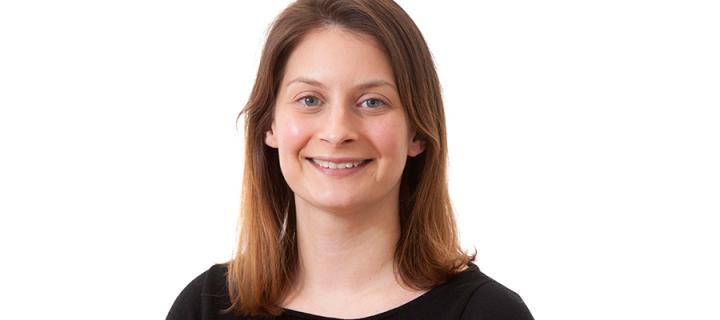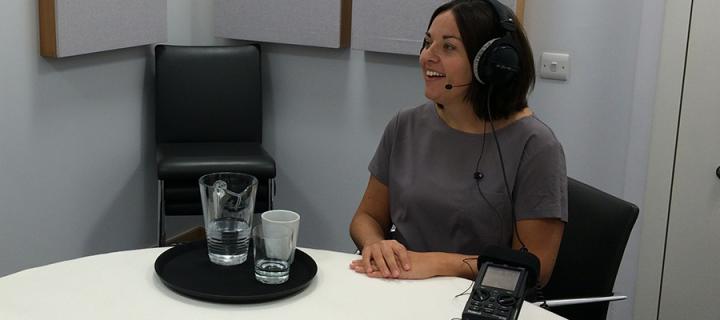Voice activated
Alumna Dr Phillipa Rewaj explains how Speak:Unique, the Voicebank Research Project came about and how speech is central to maintaining identity and quality of life.

Established in 2011, the Voicebank Research Project aims to repair voices and reclaim identity for those who have lost, or may lose the ability, to communicate using speech.
The project is a multidisciplinary team effort, with clinical researchers from the Euan MacDonald Centre and the Anne Rowling Regenerative Neurology Clinic working with the University of Edinburgh Centre for Speech Technology Research.
To find out more about the project including its origins and its implications, we spoke to research speech and language therapist Dr Phillipa Rewaj.
Drawn to speech and language
Hailing originally from Cheshire, Phillipa moved to Scotland in 2002 to study English language at the University of Glasgow. It was the linguistics side of the undergraduate degree programme that captured her imagination, in particular clinical linguistics and speech pathology. From Glasgow she went on to train as a speech and language therapist at Queen Margaret University, Edinburgh, gaining a graduate diploma in speech and language therapy.
While looking for her first clinical position she spotted an advert for a PhD studentship at the University of Edinburgh supervised by cognitive neuroscientist Dr Thomas Bak and neuropsychologist Professor Sharon Abrahams. Between 2009 and 2013 Phillipa studied the nature of language and cognitive changes in people with Motor Neurone Disease from across Scotland.
Knowing very little about Motor Neurone Disease before starting my PhD, I came to learn a lot working as part of the Euan MacDonald Centre for Motor Neurone Disease Research.
Preserving identity
It was during her PhD, and through Phillipa’s connections with Thomas Bak and Euan MacDonald that the idea for the Voicebank Research Project came about.
In 2010, when Euan started to experience increasing problems with his speech, he approached researchers at the Euan MacDonald Centre about the possibility of being able to use a communication aid with a synthetic voice that sounded like himself. As Euan had two young boys at the time, he felt it was especially important that he could preserve a piece of his identity for them.
As a linguistics graduate, I know how important a person's speech can be to defining who you are, so donating to the Voicebank was a great opportunity to help others retain and reclaim their identity.
Hillwalking researchers
It was a chance encounter that led to the next stage of the process. On a trip with Edinburgh University Hillwalking Club, Dr Bak discussed the concept with a fellow hillwalker who happened to be a researcher at the University’s School of Informatics.
As it transpired, some of the world’s leading researchers in speech synthesis were based at the School, including Dr Junichi Yamagishi who had pioneered a new method of speech synthesis using donor voices in addition to an individual’s own.
The use of donor voices in this way is what makes Speak:Unique - unique! It means that only a short amount of speech recording is needed from any one individual, rather than the 6-10 hours previously required by other synthesis methods.
Clinical care

With Phillipa’s background in speech and language therapy she became involved in the project to take this pioneering speech synthesis method into its clinical application, working with people who may need to use communication aids to build personalised synthetic voices for their devices.
After completing her thesis in 2013 Phillipa began working at the Anne Rowling Regenerative Neurology Clinic to lead the project from the clinical side, working with patients and clinicians to evaluate and refine the synthetic voices and assess their impact on quality of life.
At the beginning of 2016 the project was given a Scottish Government grant to explore and evaluate the real-world NHS journey from voice consultation and recording to voice delivery. This development will see NHS clinicians trained to use the voicebanking technology and assess its application as part of routine clinical care.
I donated my voice for the Speak: Unique voicebank research project after my close friend Gordon Aikman was diagnosed with MND and going with him to the Anne Rowling clinic, where I saw how much important research is being done to tackle neurological diseases. By donating our voices we can make a real difference to so many people’s lives. We can allow them to keep that part of their identity, so they aren’t limited to only a few different computerised voices pre-installed to a device.
Personalised digital voices
The initial trial pilot will be rolled out through NHS services in Lothian, Fife and the Forth Valley, starting early autumn. People with communication impairments who are eligible will be invited to join the project clinical study by their local speech and language therapists.
If the pilot phase in Scotland proves successful, the hope is to expand the project throughout the rest of the UK and take another step closer to achieving the goal of providing personalised digital voices, simply and efficiently for all.
It’s a fantastic project to be involved in and one that I hope will make a meaningful difference to the lives of communication aid users. It’s also an excellent example of real interdisciplinary working and how the right people being in the right place, at the right time can have great results!
Further information
You can find out more about Speak:Unique, the Voicebank Research Project including how to become a voice donor via the project website.
Related links
The Euan MacDonald Centre for Motor Neurone Disease Research

